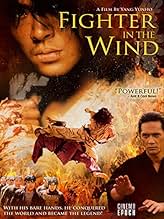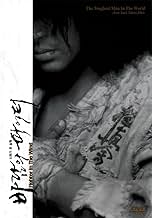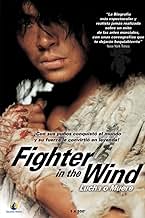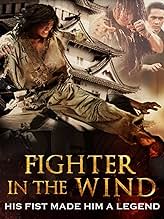IMDb रेटिंग
6.9/10
4.3 हज़ार
आपकी रेटिंग
अपनी भाषा में प्लॉट जोड़ेंIt is a Korean boy who went to Japan and started to learn Karate from his brother.It is a Korean boy who went to Japan and started to learn Karate from his brother.It is a Korean boy who went to Japan and started to learn Karate from his brother.
- पुरस्कार
- 1 जीत और कुल 2 नामांकन
Kim Won-shik
- Boy
- (as Won-sik Kim)
फ़ीचर्ड समीक्षाएं
This korean movie claims to be inspired by the life of Choi Bae-dal, who founded the kyokushinkaikan variation of Karate, and the film explores the prejudice between the Koreans and the Japanese back then.
The setting is in post-WWII Japan, with Yakuzas and American GIs abound, not to mention the influx of Korean immigrants. This film narrates the life of Bae-dal in a fairly straightforward way, following his path to fame amongst fighters - taking on karate, judo and even kendo exponents.
Somehow this film parallels Stephen Chow's KungFu Hustle, which also narrates the life of a nobody to a somebody, with a pretty babe in tow for good measure, except this one is without the slapstick comedy.
The first half plods on, as our protagonist is still a greenhorn in the martial arts world. Once you've gotten past the first hour, things start to pick up when he trains himself to be the best of the best, but towards the finale, it somehow hints of Tom Cruise's The Last Samurai. Probably no fault of its own, as it explores the same theme amongst all martial arts - honour and justice.
The fight scenes, which looked spectacular in the trailers, actually offers nothing new. Most of it are quick cuts and slow motion, and given the premise, could've offered more in terms of actual fights.
This should appeal to those who wanna know more about the myth behind Kyokushinkaikan Karate. If you're looking for real Kung-Fu action, you'll probably be better off with a Jet Li martial arts movie.
The setting is in post-WWII Japan, with Yakuzas and American GIs abound, not to mention the influx of Korean immigrants. This film narrates the life of Bae-dal in a fairly straightforward way, following his path to fame amongst fighters - taking on karate, judo and even kendo exponents.
Somehow this film parallels Stephen Chow's KungFu Hustle, which also narrates the life of a nobody to a somebody, with a pretty babe in tow for good measure, except this one is without the slapstick comedy.
The first half plods on, as our protagonist is still a greenhorn in the martial arts world. Once you've gotten past the first hour, things start to pick up when he trains himself to be the best of the best, but towards the finale, it somehow hints of Tom Cruise's The Last Samurai. Probably no fault of its own, as it explores the same theme amongst all martial arts - honour and justice.
The fight scenes, which looked spectacular in the trailers, actually offers nothing new. Most of it are quick cuts and slow motion, and given the premise, could've offered more in terms of actual fights.
This should appeal to those who wanna know more about the myth behind Kyokushinkaikan Karate. If you're looking for real Kung-Fu action, you'll probably be better off with a Jet Li martial arts movie.
To be quite honest, I didn't know anything about this film before I had purchased it. In fact, I had only bought it for two reasons. The first was that I knew it was a martial arts film and two, because it featured Masayo Kato, who appears in a few movies that I happen to like. However, by the time I had finished watching the movie, I had to admit that it exceeded my expectations for a few reasons. For instance, it had some drama, which most martial arts films tend to lack; the picture quality was superb; and above all, it was an autobiographical sketch based on a real life martial arts master.
I won't go over the story, as I'm sure that a few other people had already given it away anyway. But to those who have criticized the film on the basis that it was "boring" just because the fights were too quick and not very well choreographed, I think it's important for them to acknowledge the fact that this was based on a true story. Most fights really did end relatively quick because of Choi Bae-dal's lethal blows. In fact, it was said that most fights between him and his opponents did not last more than three minutes, while other matches ended with only single blows coming from one of Bae-dal's kicks or punches.
Needless to say, I did enjoy the film as I've already emphasized above and was glad that I saw it for another reason: because I would not have embraced Bae-dal's depicted character with the same respect that I currently have for the other great martial arts legends, the likes of which include Musashi, Bruce lee, Wong Fei Hong, et al.
8 out of 10
I won't go over the story, as I'm sure that a few other people had already given it away anyway. But to those who have criticized the film on the basis that it was "boring" just because the fights were too quick and not very well choreographed, I think it's important for them to acknowledge the fact that this was based on a true story. Most fights really did end relatively quick because of Choi Bae-dal's lethal blows. In fact, it was said that most fights between him and his opponents did not last more than three minutes, while other matches ended with only single blows coming from one of Bae-dal's kicks or punches.
Needless to say, I did enjoy the film as I've already emphasized above and was glad that I saw it for another reason: because I would not have embraced Bae-dal's depicted character with the same respect that I currently have for the other great martial arts legends, the likes of which include Musashi, Bruce lee, Wong Fei Hong, et al.
8 out of 10
I watched this movie the other night, but i found it quite enjoyable. While I will agree that though there are enough fights, they aren't nearly long enough. But the length of the fight isn't what makes them good, it's how well they're done with the time given. Like if you're going to throw a punch at someone, but stop yourself only centimeters from your target, proving to everyone that you have defeated him and he was powerless to stop you, well that is pure quality right there. I loved the main character. He willingly put himself through hell with his training, and became one of the most focused and determined fighters i've ever seen in a movie The story wasn't the best, but i still found this movie fun
OK, first things first; this is NOT a martial arts kung-fu beat em up movie (If you want that, go watch Ong-Bak!). Throw those expectations OUT and prepare to enjoy a very gripping action/drama with some of the most beautiful filmwork i've seen in a while. To keep it simple, this movie is very exaggerated biography of Choi Baedal (Later changed his name to Mas Oyama), founder of Kyokushin karate, starting from before WW2. The fight scenes are not like standard kungfu flicks. They don't fight for 5 minutes. It's realistic in this sense. They trade a few blows and one or the other falls down in severe pain. This movie screams of a comic book feel. Fight scenes are stopped in mid-action to emphasize the form and the impact of the blows, the color and framing of each shot is reminiscent of comics as well. It emphasizes Choi Baedal's super-heroish qualities. The storyline is very interesting, although it runs a little long. Overall, its a very beautiful film to watch. Its great to see a movie really focus on the philosophies and ideas of martial arts rather than just the fighting itself. It also deals with the fears mindset of a fighter. Its VERY sad, and can sometimes come off as corny, but the overall emotional impact is there. Watch it, and remember, its NOT a pure kung fu beat em up movie and you will enjoy it.
'Paramui Paito (Fighter in the Wind) is based on the events in the life of legendary Korean martial artist Choi Bae-dal. Or more precisely, the film is based on the comic book based on the martial artist's life _ a difference that can be felt throughout this entertaining but factually suspect movie.
The first of a handful of local films about famous Koreans who lived during the Japanese occupation period, ''Fighter in the Wind tells of the early part of Choi¡¯s life, how he sneaked into Japan in the late 1930s in hopes of becoming a pilot, joined the martial arts community there, and after training by himself in the mountains for 18 months, came down to become the top fighter of that country.
The film offers a seemingly sentimentalized version of the same story, especially playing up the outsider aspect of Choi's experiences, of his being a Korean in Japanese society. Given the story's xenophobic elements, which include evil yakuzas exploiting Koreans, it will be interesting to see how a Japanese audience responds to the film when it gets released there as planned.
''Fighter¡¯s best moments hint at the moral complexity of films like ''Raging Bull,¡¯¡¯ Martin Scorcese¡¯s boxing masterpiece. At first, Choi¡¯s motivation to become Japan¡¯s best seems to be connected to righting injustices felt by Koreans in Japan, but as he travels to martial arts schools enduring punishment after punishment, it becomes less clear as to what he is trying to prove.
But such insights are all too brief in the film, which is so heavy on the melodrama and action that it's difficult to take too seriously. By the end, the story resembles a kung fu film from Hong Kong, complete with a geisha girlfriend (Ara Hirayama), who tries to turn Choi into a lover not a fighter, and elder statesmen of the Japanese martial arts community who will go to any lengths to keep a Korean from becoming Japan's best. It's not the most inventive of plots, but the film keeps it entertaining throughout.
Singer and actor Bi (Rain) was initially cast for the lead role of Choi but had to pull out due to schedule conflicts. It¡¯s a good thing too, for the rail-thin pop singer wouldn¡¯t have been able to take the physical punishment the role required.
Instead, we get Yang Dong-geun, a burly actor who plays the part to near perfection. It¡¯s refreshing to see this young and talented actor take on a substantial role for a change, and he brings to ''Fighter the necessary savagery and physical presence to make it work.
The first of a handful of local films about famous Koreans who lived during the Japanese occupation period, ''Fighter in the Wind tells of the early part of Choi¡¯s life, how he sneaked into Japan in the late 1930s in hopes of becoming a pilot, joined the martial arts community there, and after training by himself in the mountains for 18 months, came down to become the top fighter of that country.
The film offers a seemingly sentimentalized version of the same story, especially playing up the outsider aspect of Choi's experiences, of his being a Korean in Japanese society. Given the story's xenophobic elements, which include evil yakuzas exploiting Koreans, it will be interesting to see how a Japanese audience responds to the film when it gets released there as planned.
''Fighter¡¯s best moments hint at the moral complexity of films like ''Raging Bull,¡¯¡¯ Martin Scorcese¡¯s boxing masterpiece. At first, Choi¡¯s motivation to become Japan¡¯s best seems to be connected to righting injustices felt by Koreans in Japan, but as he travels to martial arts schools enduring punishment after punishment, it becomes less clear as to what he is trying to prove.
But such insights are all too brief in the film, which is so heavy on the melodrama and action that it's difficult to take too seriously. By the end, the story resembles a kung fu film from Hong Kong, complete with a geisha girlfriend (Ara Hirayama), who tries to turn Choi into a lover not a fighter, and elder statesmen of the Japanese martial arts community who will go to any lengths to keep a Korean from becoming Japan's best. It's not the most inventive of plots, but the film keeps it entertaining throughout.
Singer and actor Bi (Rain) was initially cast for the lead role of Choi but had to pull out due to schedule conflicts. It¡¯s a good thing too, for the rail-thin pop singer wouldn¡¯t have been able to take the physical punishment the role required.
Instead, we get Yang Dong-geun, a burly actor who plays the part to near perfection. It¡¯s refreshing to see this young and talented actor take on a substantial role for a change, and he brings to ''Fighter the necessary savagery and physical presence to make it work.
क्या आपको पता है
- ट्रिवियाThis movie is based on the true life story of Choi Yeong-eui (who later changed his name to Masutatsu Oyama), the founder of Kyokushin Karate. Choi was born in South Korea in 1923, immigrated to Japan in 1938, and founded the Kyokushin Karate organization in 1953. Currently, Kyokushin Karate is practiced by more than 12 million practitioners in over 120 countries around the world.
- कनेक्शनFeatured in WatchMojo: Top 10 Underrated Martial Arts Movies (2017)
- साउंडट्रैकIllusive Consensus
Lyrics by Simone Simons
Music by Mark Jansen, Ad Sluijter, Coen Janssen Simone Simons
Performed by Epica
टॉप पसंद
रेटिंग देने के लिए साइन-इन करें और वैयक्तिकृत सुझावों के लिए वॉचलिस्ट करें
- How long is Fighter in the Wind?Alexa द्वारा संचालित
विवरण
- रिलीज़ की तारीख़
- कंट्री ऑफ़ ओरिजिन
- आधिकारिक साइट
- भाषाएं
- इस रूप में भी जाना जाता है
- Fighter in the Wind
- फ़िल्माने की जगहें
- उत्पादन कंपनियां
- IMDbPro पर और कंपनी क्रेडिट देखें
बॉक्स ऑफ़िस
- बजट
- $60,00,000(अनुमानित)
- दुनिया भर में सकल
- $1,518
- चलने की अवधि2 घंटे
- रंग
- ध्वनि मिश्रण
- पक्ष अनुपात
- 1.85 : 1
इस पेज में योगदान दें
किसी बदलाव का सुझाव दें या अनुपलब्ध कॉन्टेंट जोड़ें

























